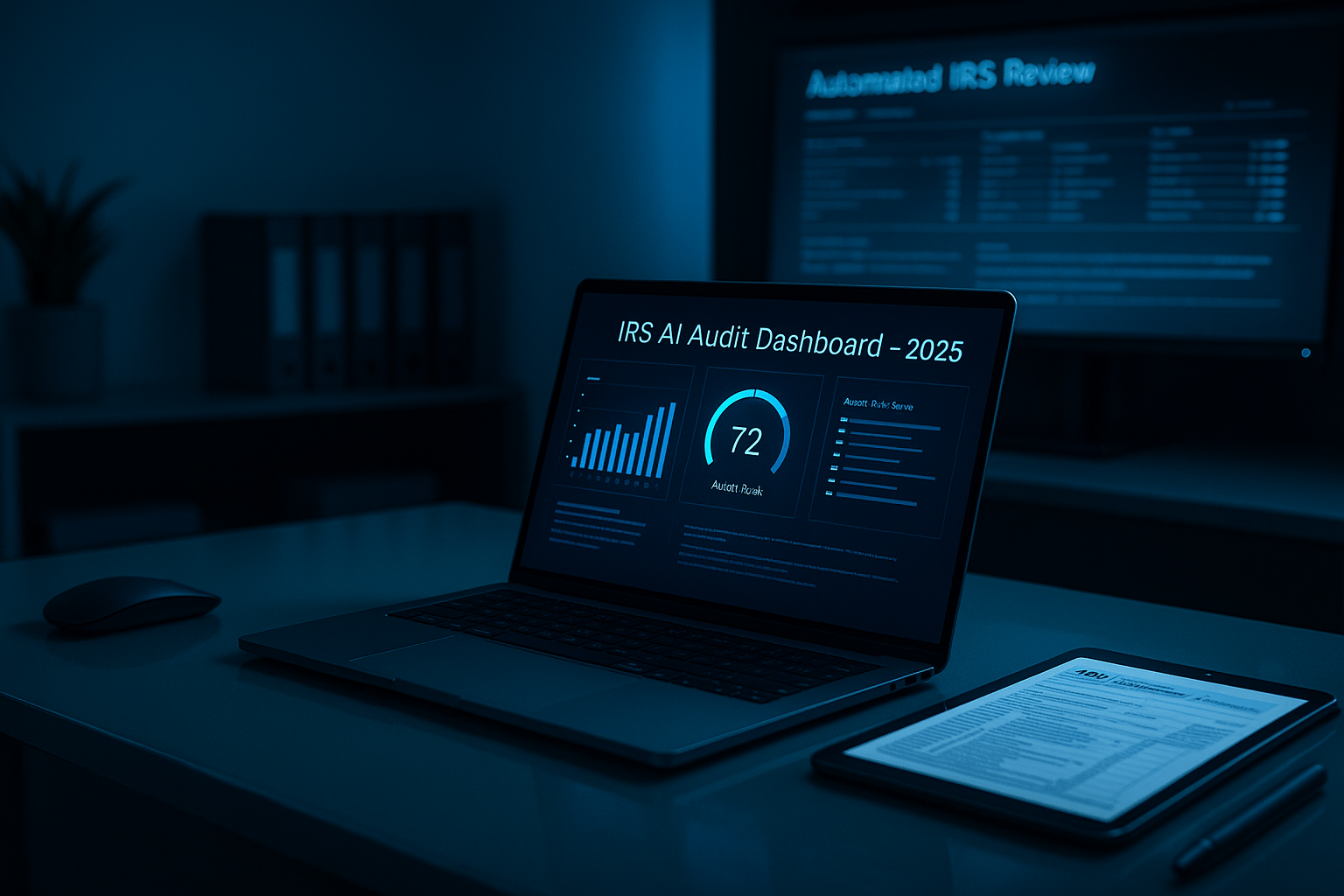
IRS AI Audits 2025 Are Expanding: What Taxpayers Should Know
IRS AI Audits 2025: How Artificial Intelligence Is Reshaping Tax Enforcement
As the Internal Revenue Service (IRS) adopts artificial intelligence (AI) to streamline and strengthen its audit processes, the IRS AI audits in 2025 mark a major shift in tax enforcement. According to a recent press release featured in The National Law Review, Clear Start Tax, a national tax resolution firm, provides insights into how AI is transforming IRS enforcement in 2025.
This technological advancement allows the IRS to analyze tax returns more efficiently, identifying discrepancies and potential fraud with greater accuracy. As a result, taxpayers can expect a more targeted and sophisticated audit process, emphasizing the importance of accurate reporting and thorough documentation.
Why the IRS Is Using AI to Flag Tax Returns
The IRS has begun employing AI algorithms to review tax returns, aiming to identify audit risks more effectively. These systems detect patterns and anomalies—especially statistical outliers—that might suggest underreporting, misreporting, or noncompliance.
Clear Start Tax outlines several audit triggers that the IRS’s AI systems are now programmed to flag:
- High Schedule C losses or underreported business income
- Large charitable deductions that don’t align with reported income
- Cryptocurrency transactions without matching 1099 or capital gains reporting
- Round-number deductions or expenses suggesting estimates instead of documentation
- Earned Income or Child Tax Credit claims without supporting data
“AI is changing how the IRS identifies audit risks,” said the Head of Client Solutions at Clear Start Tax. “Returns are now evaluated using algorithms that can flag potential red flags faster and more broadly than traditional review methods, which means even small errors can have big consequences.”
Who’s Most Likely to Be Affected?
Contrary to popular belief, IRS audits aren’t just targeting high earners. The rise of AI audits increases scrutiny across all income levels, especially among:
- Freelancers and gig workers
- Self-employed individuals
- Taxpayers who rely on DIY tax software
- Individuals with crypto transactions or inconsistent reported income
According to Clear Start Tax, common filing errors, such as mismatched 1099s, forgotten side income, or unsupported deductions, can now be picked up automatically by IRS algorithms.
In particular, taxpayers receiving CP2000 notices or other IRS correspondence should be aware that these automated notices often stem from AI-based flags.
How Taxpayers Can Prepare for an AI-Driven Audit Environment
To avoid unexpected audits or IRS inquiries, Clear Start Tax recommends the following best practices:
- Keep detailed and organized records of all income and expenses
- Avoid estimating numbers—use actual figures and supporting documentation
- Be cautious when claiming credits and deductions
- Report cryptocurrency and digital asset transactions accurately
- Respond promptly and thoroughly to any IRS communication
This is especially important for those entering repayment plans, pursuing penalty abatement, or seeking relief through the IRS Fresh Start Program.
How Clear Start Tax Supports Clients Through AI-Enhanced Audits
Clear Start Tax is assisting individuals and businesses in preparing for the new IRS audit landscape by offering:
- Pre-filing audit risk reviews to catch potential issues early
- Documentation support to help clients verify every income source and deduction
- IRS audit response services, including help with CP2000 letters and formal audits
- The Fresh Start Program assists those facing significant tax debt
Their proactive, transparent approach ensures that clients are well-equipped to handle modern IRS challenges.
What Makes AI Audits Different from Traditional Audits?
AI-powered audits differ significantly from manual IRS audits in how cases are flagged, prioritized, and pursued. Traditional audits often relied on random selection or manual detection of anomalies. In contrast, AI systems:
- Continuously learn from past audits to identify high-risk patterns
- Use big data to assess millions of returns for statistical irregularities
- Can instantly cross-reference third-party reporting (like 1099s or W-2s)
- Make it harder to “slip through the cracks,” even with minor filing issues
This means the IRS can now review more returns with fewer human resources, dramatically increasing audit reach. The goal is precision targeting, not blanket enforcement, but that also means fewer second chances for errors or oversight.
Can You Dispute an AI-Triggered IRS Audit?
Yes. Even with the rise of IRS AI audits in 2025, taxpayers still have the right to dispute findings. While artificial intelligence may trigger the audit, human agents review the case once documentation is submitted. Taxpayers retain the right to dispute IRS findings and submit evidence. That said, timing is critical. If you receive a CP2000 notice or audit letter:
- Don’t ignore it—respond within the specified window
- Gather relevant documents (receipts, statements, letters)
- Get professional help to draft your response accurately
- If needed, appeal the audit findings or request a reconsideration
Tax Debt Lawyer helps clients draft IRS responses, collect substantiating documents, and manage communications with revenue officers to ensure your rights are protected throughout the process.
Get Expert Help with IRS Audit Risk and Tax Debt
With the IRS now using artificial intelligence to automate and expand its auditing capabilities, the margin for filing errors is smaller than ever. Whether you’re self-employed, managing tax debt, or unsure if you’ve filed correctly, it’s essential to seek experienced help.
At TaxDebtLawyer.com, we help clients across the U.S. reduce audit risk, resolve tax debt, and communicate effectively with the IRS. Our team can guide you through audits, CP2000 notices, tax penalties, and more.
Don’t wait until you receive an IRS letter—contact us today to get the support you need and protect your financial future.
Frequently Asked Questions (FAQs)
1. What types of taxpayers are least likely to be audited by the IRS?
Taxpayers with simple returns, such as W-2 employees without itemized deductions or additional income sources, are generally at lower risk. However, no one is entirely exempt from audit, especially with the IRS’s increased automation.
2. Does the IRS notify you before using AI to assess your return?
No. The IRS does not inform taxpayers when AI is used to review a return. AI is part of the IRS’s internal processing and risk evaluation, which can lead to audit letters or CP2000 notices based on flagged discrepancies.
3. Can tax preparers help prevent AI-triggered audits?
Yes. Experienced tax professionals understand the patterns that AI systems look for. They can help ensure accurate reporting, match supporting documents correctly, and avoid audit red flags. Consider a professional review if you’re self-employed or have complex deductions.
4. How long does it take the IRS to initiate an AI audit?
Most IRS notices are sent within 6–12 months of filing, though AI reviews can begin shortly after submission. Automated systems can flag issues before human auditors even begin their work, so early accuracy is critical.
5. What should I do if I disagree with the audit outcome?
You have the right to appeal. If you believe the IRS’s findings are incorrect, you can provide additional documentation, request reconsideration, or file a formal appeal. A tax resolution firm or attorney can help you build a strong case.
Key Takeaways
- IRS audits are becoming more automated in 2025 through the use of AI, enabling faster and broader detection of tax discrepancies.
- AI-powered systems flag returns with patterns that suggest underreporting, such as large deductions, inconsistent income, or missing crypto disclosures.
- Taxpayers in the gig economy or self-employed are especially vulnerable to AI audits due to complex income streams and fewer oversight tools.
- Responding to IRS notices quickly and accurately is more important than ever, especially for those receiving CP2000 or audit letters.
- Professional support can reduce audit risk and improve your ability to dispute IRS findings, particularly with programs like the Fresh Start Initiative.
This article is based on the press release “IRS AI-Powered Audits Are on the Rise – Clear Start Tax Shares What to Watch for in 2025,” originally published by The National Law Review. Credit is given to Clear Start Tax for the insights shared.
Free Tax Case Review
If you are struggling with tax debt or have received a letter from the IRS complete the form below.Attorney Advertising. This site is a legal marketing service and does not provide legal advice. Submitting information does not create an attorney-client relationship. Results are not guaranteed.
IRS Audit
You received an audit notice from the IRS
Tax Debt Relief
You owe the IRS money and are looking for relief options
Wage Garnishment
The IRS is taking part of your wages to pay off your debt
Tax Lien
The IRS put a legal claim on your property
IRS Property Seizure
The IRS is going to take your property to pay down or pay off your tax debt
Penalty Abatement
You want to request to remove or reduce penalties assessed by IRS
Innocent Spouse Relief
Relief from joint tax debt caused by your spouse or former spouse
Tax Debt FAQ
Common facts, questions and answers about tax debt and tax debt reilef
Tax Debt Lawyer
A tax debt lawyer can help you with your tax debt problems
Recent Posts
- If I Owe the IRS But Can’t Afford to Pay: Your Relief Options
- Who Qualifies for the IRS Hardship Program: Understanding Currently Non-Collectible Status
- What Debts Qualify for the Fresh Start Program: Eligible Debt Checklist
- What Happens If You Owe the IRS More Than $25,000: Your Tax Relief Options
- IRS Tax Debt Relief Eligibility: Complete Guide to Qualifying for Tax Resolution Programs



